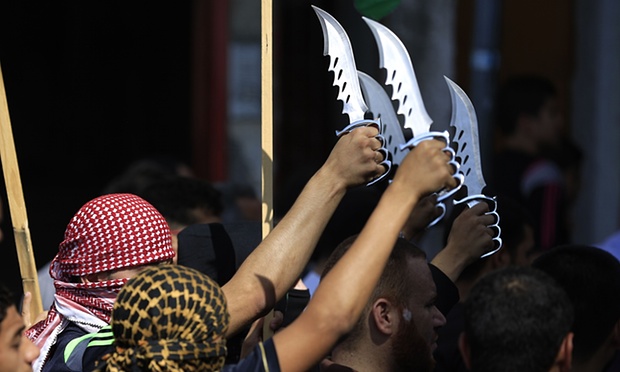Tensions ran high in Israel on Friday as Palestinians rioters in the occupied West Bank set fire to a Jewish shrine near Nablus and a Palestinian who had disguised himself as a journalist stabbed an Israeli soldier near Hebron.
The incidents came as Israeli security forces gradually expanded their new checkpoints through east Jerusalem, cutting off large parts of the city to traffic between Jewish and Palestinian neighbourhoods.
After two weeks of violence in the region, the United Nations security council was scheduled to meet at the request of Jordan to discuss the escalating tensions.
Violent clashes also flared up along the Gaza border fence, where a Palestinian was shot dead after dozens tried to break through the fence. According to Palestinian medical sources in Gaza, the youth was killed in clashes near the Erez border crossing during a day when 27 others were wounded, among them 11 by live bullets both in the north and south of the coastal enclave.
The burning of the shrine – the tomb of the biblical patriarch Joseph – near the northern West Bank town of Nablus came as about 100 people converged on it and set it ablaze before Palestinian security forces arrived and pushed them back.
The arson attack was condemned by the Palestinian president, Mahmoud Abbas. Under pressure over recent comments that some have labelled incitement, Abbas quickly condemned the fire, saying that the attack “offends our culture, our religion and our morals”.
An Israeli military statement about the shrine attack said: “We view this incident with gravity and strongly condemn any attack on holy sites. We will find and arrest those who set the fire.”
Advertisement
Several hours later, a Palestinian posing as a journalist in Hebron wounded an Israeli soldier with a knife before being shot dead. The Foreign Press Association in Israel and the occupied Palestinian territories condemned the incident as a “violation of press privilege”.
In a sign of the evidence for the growing conflict between the two sides to spread outside Israel and the occupied Palestinian territories, thousands of Jordanians took to the streets Friday. They called on the government to scrap its peace treaty with Israel, which they accuse of violations in Jerusalem’s al-Aqsa mosque compound.
Jerusalem itself – which has seen a spate of violent incidents in the past two weeks – was relatively quiet on Friday. Israeli security forces continued to erect checkpoints between Jewish and Palestinian neighbourhoods across the city, including in central areas around the landmark American Colony hotel and St George’s cathedral.
In Issawiya, a Palestinian neighbourhood in a valley below one of the Hebrew University’s campuses, police had sealed all entrances. Those wishing to leave had to pass through a checkpoint of new blocks, with men asked to lift their shirts and show their shoes before having their papers checked. As Palestinians waited to cross in small numbers, Israeli civilians in cars, two accompanied by small children wearing helmets, brought food to the border police.
Palestinian residents of the east Jerusalem neighbourhood of Issawiya wait to pass an Israeli checkpoint on Friday, one of a number to have been set up around the city at the government’s instruction.
Among those leaving on Friday to go and pray at al-Aqsa was Majdi Fahmi, 52. “The closure started slowly three days ago,” he said. “At first they allowed a few cars in and out of one of the entrances. Now they are all closed.
“A lot of shops already are short on basic supplies because deliveries cannot get in. I missed work yesterday because I missed my lift to Tel Aviv where I work in construction. No one knows what to expect, how long it will last.”














